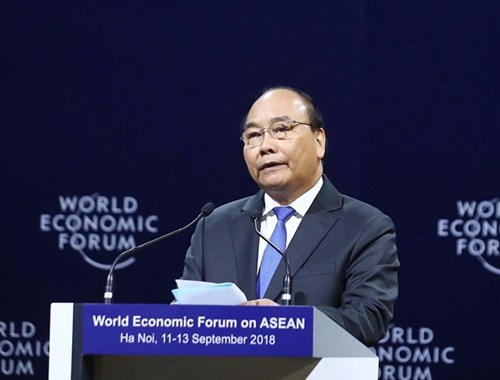The WEF ASEAN 2018, themed “ASEAN 4.0: Entrepreneurship and the Fourth Industry Revolution”, attracts leaders of ASEAN countries and partner nations, over 1,000 delegates who are WEF members, and representatives of businesses from around the world.
    |
 |
|
Prime Minister Nguyen Xuan Phuc speaks at the opening plenary session of the WEF ASEAN 2018 in Hanoi on September 12 |
The opening session, which also saw the presence of General Secretary of the Communist Party of Vietnam Central Committee Nguyen Phu Trong, focused on ASEAN priorities in the age of Industry 4.0.
WEF Executive Chairman Schwab said Industry 4.0 will bring fundamental and breakthrough changes in business models, economies and societies. Global competition will be shaped by competitiveness instead of cost factors. In this context, the countries succeeding in mastering Industry 4.0 will have innovation and entrepreneurial ecosystems.
To have successful directions in Industry 4.0, ASEAN governments need to create favourable conditions for start-ups as well as small- and medium-sized enterprises (SMEs). The coordination between governments and businesses is very important to obtain progress in Industry 4.0, he noted.
He expressed his belief that ASEAN countries, with appropriate visions, the best policies, young population and high entrepreneurial spirit, will take the lead in this revolution.
Addressing the event, PM Phuc stressed that high technology and digital economy are highly potential fields in ASEAN. They are forecast to rise fourfold to surpass 200 billion USD by 2025.
Analysing opportunities that Industry 4.0 brings to ASEAN member states, he mentioned breakthroughs in productivity in the five major industries: electronics, chemicals and oil and gas, consumer goods, food, and pharmaceutical. It is also necessary to promote more inclusive growth towards the United Nations’ Sustainable Development Goals by applying Industry 4.0 to create connectivity and share new values and innovations.
He believed that Industry 4.0 will also open up chances for connecting SMEs with trans-national and global markets. ASEAN can also bypass old ways of industrial development by bravely developing artificial intelligence, robots, automation, drones, satellite devices or sensory systems to improve productivity and optimize resources.
Regarding challenges facing ASEAN, the Government leader of Vietnam pointed to the risk of job loss to automation, quoting statistics of the International Labour Organisation that 56 percent of jobs in five ASEAN countries are at risk.
He noted Industry 4.0 can raise income for the people and countries with talent and knowledge, but it can also widen income gap and increase the risk of social instability.
Facing those opportunities and challenges, PM Phuc asked ASEAN countries to prioritise such fields as digital connectivity, data sharing, harmonising the business environment, promoting the formation and connection of innovation incubators, seeking and tapping into talents, and forming an ASEAN education network and the lifelong learning systems.
At this forum, Vietnam will propose new initiatives about a shared mobile network with the same prices across ASEAN and cooperation in intelligence, ensuring cyber security, manpower training, and information technology, he added.
Mentioning the launch of a passenger transportation service using Industry 4.0 technology by Go-Jerk of Indonesia and Go-Viet of Vietnam on the occasion of the WEF ASEAN, the PM said the Vietnamese Government hopes to see more cooperation like that to tell the world that the cooperation and entrepreneurial atmosphere is spreading in ASEAN.
With a combined population of over 640 million accounting for 8.5 percent of the global population, ASEAN is now the third biggest economy in Asia and the fifth in the world.
Amid the Industry 4.0 expansion and fierce regional and global competition, countries need to bolster cooperation and solidarity and bring into play the bloc’s internal strength to build a people-oriented and people-centred ASEAN of peace, stability and resilience basing on rules. ASEAN has and will continue making efforts to affirm its central role in the region and join partners to maintain peace and stability and ensuring freedom on air, on land and at sea, PM Phuc said.
Source: VNA